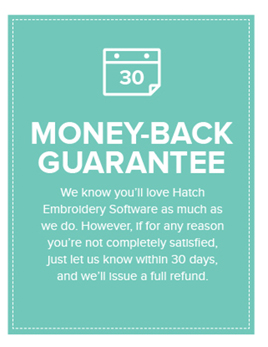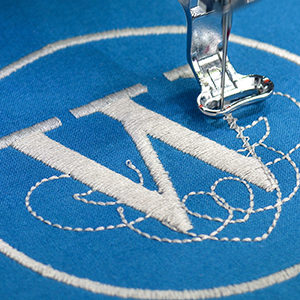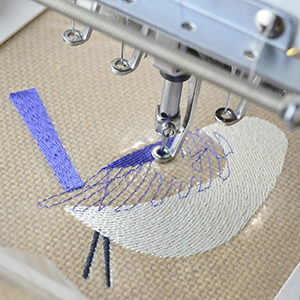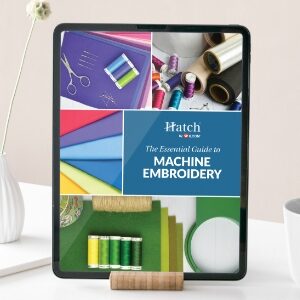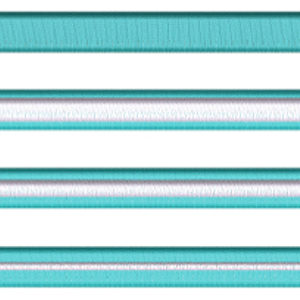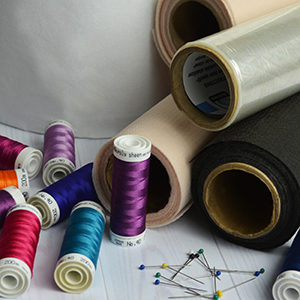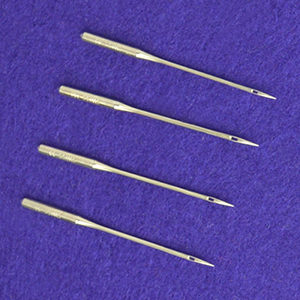The right thread will ensure your design is the best it can be!
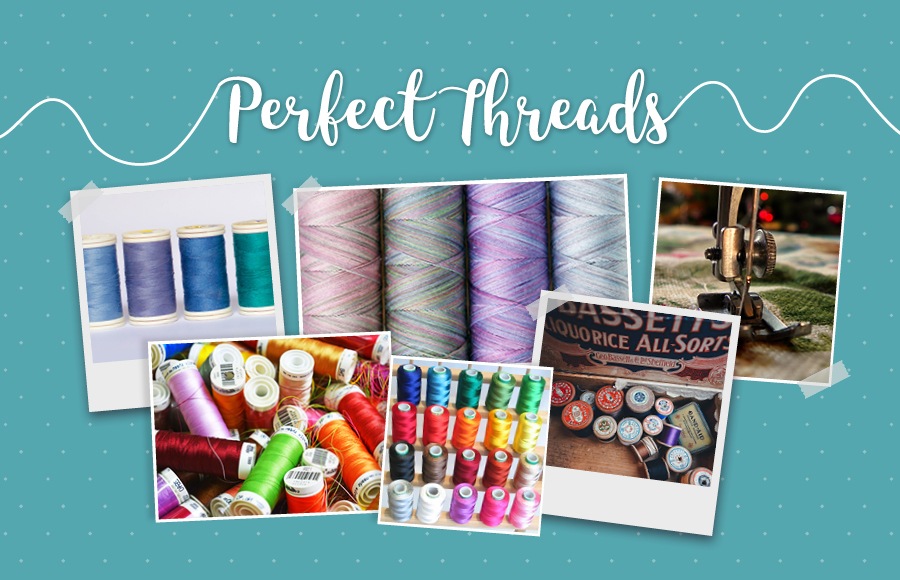
When it comes to machine embroidery, the types of threads you want to reach for are a little different to those used for hand embroidery. Machine embroidery threads come in many different materials, ranging from rayon (the most popular) to silk and to polyester. There are also less conventional threads like mylar, metallic and “special-effect” threads. Read on to learn about which threads will suit your embroidery best!
Weight and Strand Count
While it may not seem like a huge issue, the weight or size of your thread plays an important role in the final outcome as well as its compatibility with the fabric you are embroidering on. The rule of thumb here is simple: the higher the number, the finer the thread. Different types of threads (explored further below) will usually have different limitations on how fine or heavy they can go. For example cotton threads are available up to 100, whereas rayon typically does not go higher than 40. Threads also generally consist of multiple strands being twisted together. To find out the strand-count you will need to look at the number next to the weight, which tells you how many strands. For example, 80/2 would mean that the weight is 80 and the thread consists of 2 strands.
When choosing the size of your thread, it is best to consider the fabric you are embroidering on. What size threads were used? What kind of fabric is it? Is it stiff or flexible, and does it stretch? Finer threads (60 and up) are best for lighter or more delicate materials. Thicker threads are best suited to heavier duty pieces like upholstery. Another important thing to note is that different machines are suited to different types of strands, so as a final step before starting your embroidery, make sure that your thread is compatible with your machine.
Rayon
Rayon threads are the most popular for any type of embroidery, hand and machine. Rayon has a high, reflective sheen and is readily available. Rayon is the preferred thread type as it performs very well; its durability and versatility (it is available in many sizes) make it perfect for the rapid push and pull of machine embroidery.
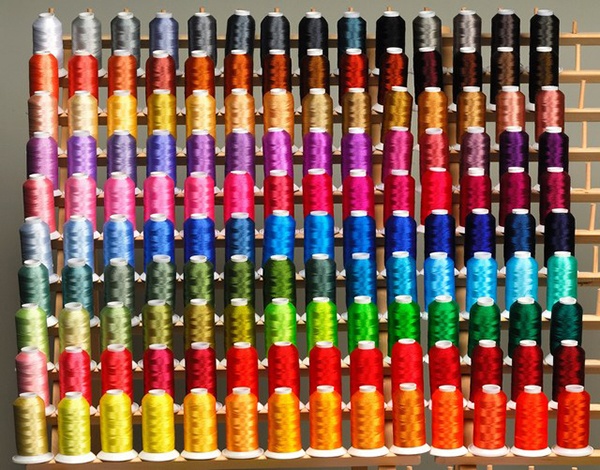
Polyester
Polyester threads are also a popular choice as they function and look similar to rayon. They do not have as high a shine as rayon however they do have a similar durability as they are not prone to fraying, shrinking or stretching. One specific feature that makes polyester an attractive option is the fact that the color does not fade even when it comes in contact with bleach, making it a great option for material that requires frequent washing.

Cotton
Cotton threads are a little less popular than polyester or rayon, as the threads are very soft and tend to be a little bit more fragile. However, this does not mean cotton is less useful than rayon or polyester! The delicacy of cotton threads makes it fantastic for finer material as the threads come in finer weights, leaving less distress on your delicate fabrics. Cotton threads also have a flatter, matte finish, so if your preferences lean away from the glossy sheen provided by rayon, silk and polyester, cotton may be for you.

Image: OliverTwistsFibres (Etsy)
Wool
Wool and other heavy-duty threads are perfect for heavier materials such as tapestries and furnishings. Wool threads come in a variety of different sizes as well, with Persian wool being the thickest and crewel wool being the finest. Wool threads are especially suited to crewel embroidery projects. Typically, wool is not one of the more popular types of thread, but if you are working with quite a hefty material, you may need to turn to a wool thread.

Silk
Silk threads are the number one choice when embroidering on delicate, luxury fabrics like silk and satin. Unsurprisingly, silk can be less durable than rayon but it is by no means a flimsy thread type. Silk holds up surprisingly well (basically as well as polyester!) especially when used on corresponding silk fabrics. However, it is quite costly and nowhere near as readily available as some others, but you’ll get a sheen that is unrivalled by any other thread!
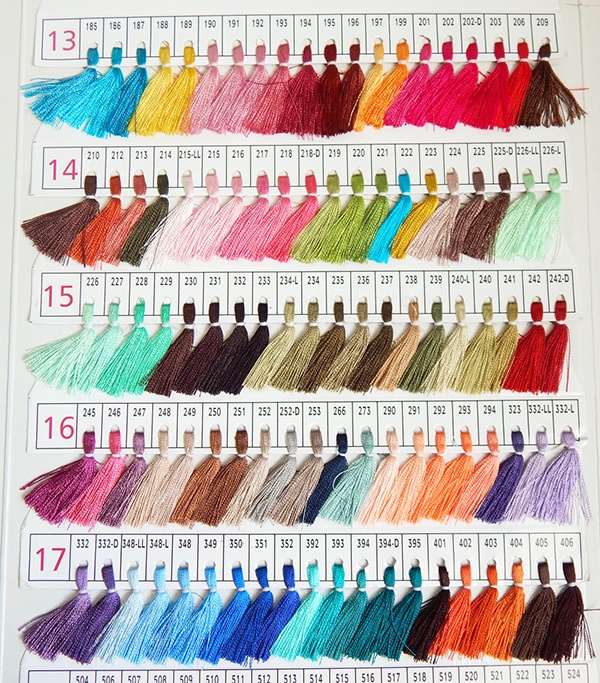
Image: EverythingIndian (Etsy)
Metallic and Mylar
Metallic and Mylar threads are less common thread types, often used more to create accents or embellishments. They require a specific type of needle. This is because they do have a tendency to break, especially when used with a high speed embroidery machine, so extra attention needs to be given to these threads. However, for those who are looking for a little something extra, they add a sparkle to your designs like no other thread, and are well worth the effort if you are looking for a little glamour!
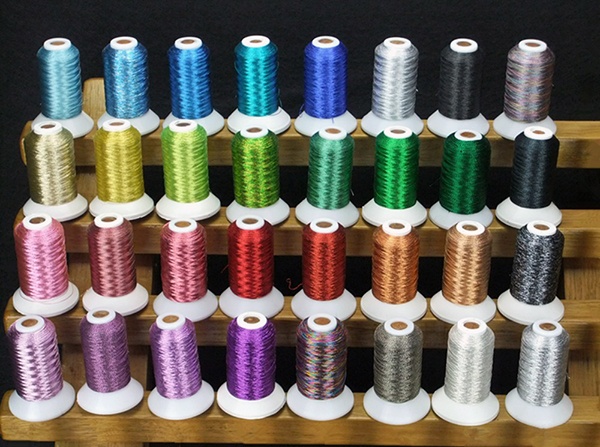
Special Effects
These threads are often acrylic or woolen and are most known for their unique aesthetic. These are used primarily for costume purposes as opposed to utility, with many special effect threads containing glow-in-the-dark technology or changing colors under different lights. These types of thread are probably the hardest to come by, and you would most likely need to place an order with speciality stores online.
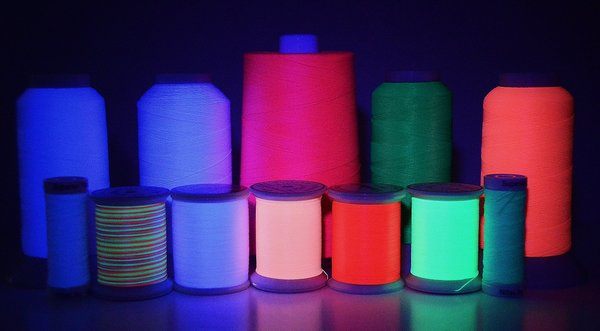
Image: Noxton.com
Bobbin Thread
Designed specifically for use with machine embroidery, bobbin thread is a lightweight thread that has the durability of rayon and polyester. It can easily withstand the rapid movements of your machine. Again, bobbin threads are very versatile and come in a variety of different sizes. It is often recommended to pair your bobbin threads with another complimentary thread of the same weight.
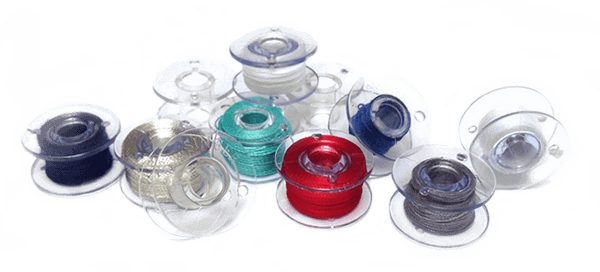
Conclusion
With all the different threads out there today, you will no doubt be able to find one that suits your needs! Remember that finding the right thread is just as important as finding the right needle and can make or break your final embroidery project, so it is key to always choose the best materials and tools for your specific purpose. However, as usual, embroidery is not always about getting things perfect in one go! Be prepared for some fairly extensive trial and error, but learning to embrace the experimental part of embroidery is one of the best parts!
Every hobbyist who appreciates the fine beauty of embroidery will appreciate how Hatch Embroidery software has revolutionized enjoyment of this long-time, honored craft. With user-friendly software and top technology, it leads the way for creating memorable and professional looking embroidery creations.
Here are just a few advantages you get with Hatch Embroidery software when it comes to threads:
Hatch Embroidery lets you sort your threads by color, code, color name, or brand!
Use any of your threads with Hatch Embroidery!
Hatch includes over 85 thread brands. If you do not find your own thread brand, you can create your own thread charts.
Do you have several brands of thread that you use?
No problem! You can combine thread charts to create your own.
Have a certain set of colors that you want to use over and over for special projects?
Hatch Embroidery has you covered! You can select these threads to make your own color set.
You have purchased a design and it came with the wrong thread brand?
No worries! You can simply select your thread brand and click “Match all”.
Want to change the color in the design?
It’s so easy with Hatch Embroidery. Just a click and you have your new color applied!
Do you have a thicker thread that you want to use?
Hatch Embroidery allows you to select the object or whole design and adjust the density (spacing) to allow for the thicker thread.
Currently, Hatch Embroidery software products are in popular use in over 100 countries. It is time to join the global trend and give Hatch Embroidery a try! The 30-day Free Trial grants you unlimited use of all the amazing features and the 30-day Money Back Guarantee ensures that there is absolutely no risk involved.
Happy Embroidering!
Bernadett & the Hatch Team





